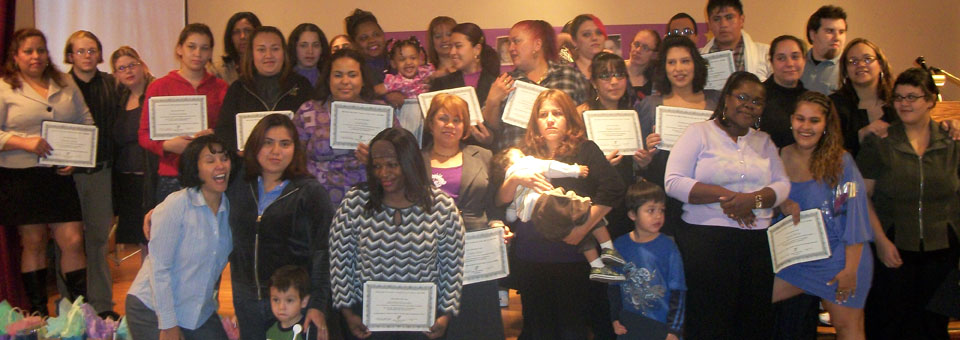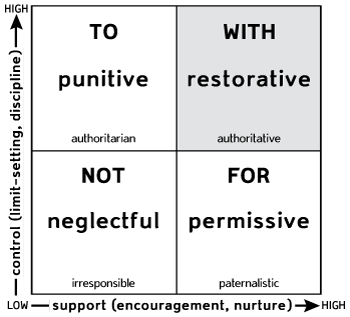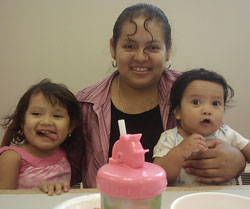This article aims to show how one nonprofit agency in Pennsylvania, USA, integrated restorative principles and processes into an early education and parenting initiative. This resulted in positive social, emotional and cognitive outcomes for young children and gave them a great foundation for success in school and in life. It also provided an opportunity for the agency’s staff to strengthen their knowledge and understanding of restorative concepts and practices, enabling them to engage more effectively as restorative leaders.
Restorative practices is “a social science that studies how to build social capital and achieve social discipline through participatory learning and decision-making” (Wachtel, 2012). Social capital accrues when individuals and organizations create a safe and supportive environment for shared values, mutual understanding and trust.
Building social capital is exactly what the United Way of Berks County’s Community Impact division had in mind when they designed and implemented the Right from the Start Initiative, a series of programs intended to support young children’s development by strengthening their parents’ confidence and skills, empowering them to be the best first teachers for their children.
 Baby College participants celebrate completion of the program.
Baby College participants celebrate completion of the program.
In 2005, administrators from the urban school district of Reading, Pennsylvania (one of the most economically deprived cities in the U.S.) (Brudereck, 2012), were struggling to address the assessment that approximately 70 percent of young children beginning school in the district lacked one or more of the skills needed to be prepared to succeed in school. City of Reading school administrators informed the staff of Berks County United Way, who were trying to help with this problem, that if students were developmentally delayed by one year, teachers and support staff would probably be able to help them be on target with their peers within a year or two. Unfortunately, many of these children were developmentally delayed by two or three years, which meant they were at risk of sliding down the dreaded “slippery slope” to truancy and dropping out of school. In addition, 52 percent of these children were living below the poverty level, and nearly 20 percent had been born to teenage mothers, many of whom had dropped out of school themselves. The city of Reading’s 12.6 percent unemployment rate (United States Department of Labor, 2005) was one more factor in what was becoming a community crisis.
To address this growing problem, United Way’s Right from the Start Initiative developed “Baby College” (now known as Baby University), a parenting support and education program with a three-pronged restorative foundation: It would be relationship-centered, strength-based and solution-focused. The goal of Baby College was to create an environment of safety and trust and to build on parents’ knowledge, strengths and value systems while helping them find positive and sustainable solutions to the parenting issues they were facing. By helping parents move forward and transforming their unhealthy attitudes and actions regarding education and parenting, the program aimed to provide their children with a better chance of success and afford the whole family a greater likelihood of living healthy, productive lives. The program’s founders hoped this would build social capital in not one but two generations, thereby strengthening civil society.
Baby College consists of nine weekly group classes, held in both English and Spanish, to accommodate the city of Reading’s 58.2 percent Hispanic and Latino population (United States Census Bureau, 2010). The classes are led by a culturally sensitive facilitator and are supplemented by weekly home visits by trained paraprofessionals who live in the neighborhoods where the parents reside, an extensive resource and referral network and one year of follow-up support. The classes do not utilize a traditional teacher-pupil model. Instead, they employ a facilitative “coaching” approach intended to maximize engagement, utilized because many of the parents did not have a positive experience with their own education.
The restorative practices hypothesis states that “human beings are happier, more cooperative and productive and more likely to make positive changes when those in positions of authority do things with them, rather than to them or for them” (Wachtel, 2012). Baby College works with parents to help them realize that they have the power to create new opportunities for their children and provide the children with a better developmental experience.
Anchored by the hopes and dreams the parents have for their children, the weekly sessions focus on such topics as brain development, play and stimulation, social and emotional development, discipline and stress. Each session is built on the one before in order to strengthen learning. Again operating according to the restorative practices “with” hypothesis, Baby College extends an open invitation to extended family members, such as grandparents, siblings or friends, to participate in both the classroom and home visits, building a base of stakeholderswho are invested in the family and child, thereby affording that child and family a greater opportunity for success.
Because many of the program’s participants have never received positive feedback or support before, it is imperative to build their confidence step-by-step in order to transfer and sustain learning. Facilitators use a variety of teaching techniques and adult learning principles. They focus first on identifying what parents and caregivers already know about a particular subject matter. From there, facilitators reinforce learning through the use of large-group facilitated discussions, small-group activities and exercises, videos, simulations and questioning techniques that help parents find positive solutions before they give up or engage in poor parenting techniques.
For example, if a parent reacts poorly to a child’s temper tantrum by yelling, belittling or even hitting her child, the facilitator will assist the class in identifying why the child might be acting out. Is he hungry, tired or bored? The facilitators ask such questions as, “Does Diego get to nap each day at around the same time?” or “I’m wondering if Diego might have been hungry?” or “If you had to guess, why do you think he acted that way?” This type of questioning assists parents in trying to problem-solve before reacting. Baby College staff members employ the “Feel, Felt, Found” process (“I feel your frustration. When my child acted out in a store, I felt… but I found that when I did x, y, or z her behavior improved, and I didn’t overreact”). With this process, staff members are able to let parents and caregivers know that they can feel what they might be feeling, planting the seeds of empathic responses that parents can use with their children. Empathy allows parents the opportunity to respond appropriately and with care rather than reacting with anger, which can lead to unproductive exchanges.
This type of engagement is exactly what McCold and Wachtel (2003) describe in the Social Discipline Window (see figure 1).
 Figure 1. Social Discipline Window (McCold & Wachtel, 2003).
Figure 1. Social Discipline Window (McCold & Wachtel, 2003).
The staff provides high support while parents are learning new concepts and practicing new techniques, but they maintain high control by explicitly communicating boundaries and limits on their behavior with their children. The high support allows parents to question and explore, while the high control gives them the structure to do so safely and respectfully. Unlike in the traditional educational settings many participants have experienced previously, in Baby College parents are not subjected to a punitive environment when they make mistakes (what is referred to as the to box). On the other hand, Baby College staff are not permissive or paternalistic, doing things for parents. Instead, both the classroom and home visitor staff understand the power of working with parents and extended family members, thereby building social capital and sustaining learning. The staff builds on parents’ and caregivers’ strengths and helps them identify the best and most effective solutions to their parenting issues. As a result, program participants feel they own the outcomes as they begin to trust in the process and in their ability to make positive changes. The safe and supportive environment increases parents’ confidence and fosters a desire for continued improvement.
While some restorative principles and practices were purposely designed into the Baby College program’s foundation, others were integrated along the way. As I began my graduate studies at the International Institute for Restorative Practices (IIRP) in 2008, I learned about the power of circles, and we started to employ them in the classroom at Baby College. During each session, participants’ chairs were placed in a circle, with the facilitator seated among them instead of at the front of the classroom. While the facilitative coaching technique continued to be a powerful engagement tool, circles took the quality of interaction to a whole new level. Circles broke down habitual barriers to engagement: Not only did participation increase, but behavior improved as well. With all participants facing one another, they felt a sense of equality. Circles created a safe space where people could speak, share their struggles, perspectives, joys and fears and also ask for support from each other. Men and women alike began to listen to each other with intent, ask purposeful questions and openly share information. They became more helpful to each other when a participant appeared to be struggling with his or her emotions or trying to determine the best solution to a situation. Participants’ trust in the classroom experience increased, which created a space for learning to take hold. Laughter became a regular part of the classroom environment, as parents and caregivers felt respected and appreciated for their participation.
One mother shared how she was struggling with what she felt to be inappropriate television viewing by her young son. She lived in a small apartment with her mother, her brother and her boyfriend. Presumably influenced by the lurid reality shows her mother loved and the violent films the men enjoyed, her four-year-old son had begun acting out, being verbally and behaviorally aggressive toward her and others. When the parent group heard about the mother’s issue, they suggested solutions with care and concern. One mother offered to come by her apartment occasionally and take her son along to play with her own son. This creative solution offered by a fellow parent allowed for minimized television time while increasing both boys’ socialization skills. Circles allowed the staff to take a back seat to the parent group in giving advice; they needed only to facilitate dialogue in order to build social capital.
 A Baby College participant and her two children enjoy the class.
A Baby College participant and her two children enjoy the class.
We continued to integrate many concepts, theories and frameworks from IIRP Graduate School courses into the Baby College curriculum and processes or as a component of staff development. For example, the Circle of Courage (Brendtro et al., 1990) emphasizes the importance of four factors needed to reclaim youth at risk: a sense of belonging, mastery, independence and generosity. In weekly staff meetings, discussion turned to the innate need to belong. Some of Baby College’s young parents were members of neighborhood gangs. Although this association did not necessarily add value to their lives, we realized that they had probably joined the gangs due to painful feelings of isolation, which could lead to depression and destructive parenting. That knowledge inspired Baby College staff to create an environment of safety, trust and belonging. By being respectful, nonjudgmental and caring yet firm in terms of acceptable and non-acceptable behavior, staff helped program participants feel that they belonged to something positive. As participants became aware of the support around them as well as the opportunities for their own personal growth, their appreciation for this support motivated them to master emotions, new tasks and skills. As a result, their confidence grew and they became more independent and willing to try new things. As they developed their sense of belonging, mastery and independence, a fourth attribute emerged: generosity. Participants became more generous with verbal appreciation, a willingness to help others and open love for their children. It was beautiful to watch this process unfold. As the parents’ confidence increased, so did their ability to utilize positive parenting, problem-solving and decision-making techniques.
“Compassionate Witnessing” (Weingarten, 2003) became another critical concept for Baby College staff in their work with parents and families. Kaethe Weingarten’s work examines the biological and psychological effects of violence and helps us understand how to be compassionate witnesses to those who have experienced trauma. Weingarten states that people reside in one of four “witness positions”: unaware and disempowered; unaware and empowered; aware and disempowered; and aware and empowered (see figure 2). Figure 2. Witness Positions. From Common Shock: Witnessing Violence Every Day (p. 28), by K. Weingarten, 2003, New York, NY: New American Library. Copyright 2003 by Kaethe Weingarten. Reprinted with permission.
Figure 2. Witness Positions. From Common Shock: Witnessing Violence Every Day (p. 28), by K. Weingarten, 2003, New York, NY: New American Library. Copyright 2003 by Kaethe Weingarten. Reprinted with permission.
As Baby College supervisory staff reflected on this new knowledge, we realized that our staff initially often resided in the unaware and empowered position. In other words, staff wanted to make a difference, but they were not aware of all the ways in which they helped participants. Sometimes they were not clear or explicit in their explanations regarding how a parent should act or respond. Other times they might not have asked the right questions in order to be able to understand what the parent was experiencing. In addition, many participants initially resided in the unaware and disempowered quadrant. They were unaware of how to help their children grow intellectually. They were unaware of what to do to help their children learn to regulate their own emotions and behavior. They were unaware of how their own attitudes, behavior and actions affected their children, and they felt disempowered to make changes because of the disadvantaged environment in which they lived.
As the staff grew in their knowledge of restorative principles and practices, along with their knowledge of child development, family dynamics and effective facilitation skills, they began to see how each concept, tool and technique fit together like pieces of a puzzle. “Working together,” as one staff member said, “is like weaving a beautiful tapestry where the common thread of all the concepts, tools and techniques is the building of social capital and the strengthening of society.” That “aha moment” strengthened her resolve to become more aware and empowered and to support our participants in becoming more aware and empowered as well. The staff also became aware of how each concept and technique could build on each other. For example, when staff were in the aware and empowered compassionate witnessing position, they were not only aware of developmental and restorative concepts and techniques, they also became empowered to bring them to life. Working with our parents and their supporters, the staff began using restorative questions, empathy and conflict-resolution techniques to bring the circle of courage to life.
For example, if a parent talked about an exchange with his child that ended poorly (i.e., with the parent yelling and the child having a temper tantrum), a staff member might use restorative questions to help the parent see how their child had been affected, as well as who else might have been affected (such as another child who had heard the exchange). Restorative questions include: What happened? What were you thinking at the time? What have you thought about since? Who has been affected? In what way? What needs to happen to make things right? (Wachtel, 2012). By engaging participants in reflecting on these questions, staff and clients alike began to think and feel more deeply than they were accustomed to. In learning a variety of conflict-resolution techniques (empathy, asking questions to deepen understanding, being mindful of their words, tone and body language, and brainstorming about effective responses to behavioral issues) staff were able to take their new knowledge and translate it into positive action.
The mother who had struggled with her child’s inappropriate television watching was initially aware but disempowered. By using restorative processes, the Baby College staff assisted her in moving into the aware and empowered window, which positively supported her child’s development. The mother was able to have a conversation with her family to discuss TV viewing and its effect on her son without engaging in a heated argument, which had been the norm in the past. As she becomes ever more aware and empowered, the mother is building her confidence and competence as her child’s first and most important teacher. What an incredible gift she is giving herself and her family.
Over the seven years since the program began, Baby College participants were not always equipped with acceptable behaviors when life got them down. They would act out, become defensive and argumentative, or they would withdraw. Some resorted to engaging in risky behaviors such as taking illegal drugs, drinking alcohol to excess or having unprotected sex, which could reduce their effectiveness as parents and endanger their own and their families’ health.
Baby College staff believes that most people have the potential to make a positive contribution to their family and society. As they learned about John Braithwaite’s work (1989) on shame and reintegration, they began to understand the importance of “separating the deed from the doer.” Braithwaite, an Australia criminologist, extensively studied crime and shame. He concluded that when we reject someone’s unacceptable behavior because it has failed to meet agreed-upon expectations or standards, but we continue to value the intrinsic value of the person in question, we can hold this person accountable for his actions while helping reintegrate him back into his family or community.
The staff also learned about the work of Donald Nathanson (1994) on how the affect (or emotion) of shame functions within the human psyche. When we feel shame, our tendency is to react in four negative ways: withdrawal, attacking one’s self, attacking or lashing out at others, or avoidance (denial, thrill seeking or drug and alcohol abuse). These shame reactions are illustrated in the Compass of Shame (see figure 3).
 Figure 3. The Compass of Shame. Adapted from Shame and Pride: Affect, Sex, and the Birth of the Self, by Donald L. Nathanson, 1994, New York, NY: W. W. Norton & Company, Inc. Copyright 1992 by Donald L. Nathanson. Adapted with permission.
Figure 3. The Compass of Shame. Adapted from Shame and Pride: Affect, Sex, and the Birth of the Self, by Donald L. Nathanson, 1994, New York, NY: W. W. Norton & Company, Inc. Copyright 1992 by Donald L. Nathanson. Adapted with permission.
Because the staff was now able to recognize these reactions to shame, they were able to interact compassionately and help participants minimize their neg
ative shame responses. This understanding of shame dovetails with Weingarten’s sense of being aware and empowered. The staff listened to clients, acknowledged their feelings and allowed for the expression of emotions. As a result, clients began to better manage their responses to shame in a more restorative manner by talking about them, expressing their feelings, listening to how others were affected, admitting where they had gone wrong, apologizing and making amends.
A few years ago a Baby College participant shared a story about her three-year-old daughter. She was shopping, and her daughter was whining about wanting a toy. The mother told her she didn’t have money for a toy, but her daughter kept whining and crying, building up to a tantrum. As the mom became frustrated, she kept saying “No!” to her daughter, each time raising her voice louder than the time before. She said people were starting to give her disapproving looks, which embarrassed her and made her even angrier with her daughter. She grabbed her daughter’s arm and yelled at her to stop making a scene. Her daughter cried louder than before, and the mother said she left the store furious, stressed and wanting to spank her daughter. As it happened, the lesson at Baby College that day was on developmental stages of three-year-olds and temper tantrums. The mother shared her story, saying she felt shame for yelling at her daughter in the store, but she just hadn’t known what else to do. (She was unaware and disempowered.) In class, she was able to express her feelings, and with her new understanding of three-year-olds’ behavior and how to effectively handle temper tantrums, she was able to see what she could have done differently (becoming aware and empowered).
Weeks later, this mother came to class, excitedly telling the others, “It worked! It really worked!” She’d had a similar shopping experience the previous weekend with her daughter but with a totally different outcome. When her daughter started whining about wanting a toy they couldn’t afford, she bent down to her level and acknowledged her wish, with empathy. Speaking softly, she told her daughter that she couldn’t buy her the toy because she didn’t have enough money. However, she told her daughter, if she behaved in the store, when they got home, they would play her favorite game, then make cocoa, snuggle up and read her favorite book. Because the mother was aware and empowered, she did not get caught up in the shame-inducing emotion of not having enough money and then lash out at her daughter in a shame response. Instead she expressed empathy and love for her daughter, stroking her hair, smiling and intriguing her with the promise of an even better gift: a fun and cozy time together.
While this restorative learning journey has had a huge effect on our parents and their children, it has also been a wonderful experience for our staff. They modeled this new learning not only with each other but also with their own families. They created a community based on our cornerstones: to be relationship-centered, strength-based and solution-focused. They supported each other in the mastery of their emotions, skills and knowledge and held each other accountable for the development of that community. They celebrated each other’s unique contributions and built on each other’s strengths. As a result, their own families have reaped tremendous benefits.
Building a restorative parenting program has resulted in many other positive outcomes. In data collected over a five-year period, only 19 percent of parents strongly agreed that they knew how to positively discipline their child prior to participation in Baby College, yet after participation, 84 percent strongly agreed. When we asked parents about their understanding of ages and stages of development before participating in the program, only 16 percent strongly agreed. After participating, 86 percent strongly agreed. Also, prior to their Baby College experience, only 25 percent of parents strongly agreed that they knew the importance of routines for their children and used them. After participating, 93 percent strongly agreed. Prior to Baby College, only 23 percent of parents said they read, sang or played with their child every day, and after participation in the program that statistic jumped to 98 percent.
According to anecdotal reports from Berks County Children and Youth Services (CYS) (but not yet verified), these statistics have the potential to correlate to a reduction in the number of claims submitted for Baby College clients’ demographic during the period when the data were gathered. CYS staff also noted an improvement in parental behaviors for those parents with open CYS cases who were referred to Baby College.
These outcomes are critical because they show that when we create an environment for safe and supportive learning, bonding develops. When our participants bond (a sense of belonging)—both with the staff and with their children—it increases engagement, and engagement directly correlates to motivation to achieve (demonstrating mastery). When we asked parents what they would tell other potential parents about Baby College, one parent responded, “Baby College has changed my life in every way possible by showing me how to meet my baby’s needs. Now I act differently toward her behavior in all situations” (demonstrating independence). Another said, “If Baby College knocks on your door, let them in!!! They will improve your parenting skills and you will do what’s right for your child, and we all want to do what’s best. I’ve shared so many things I’ve learned with my friends and other parents” (demonstrating generosity).
In addition to these outcomes, 34 percent of our participants went back to school for their general equivalency exam (equal to a high school diploma), 27 percent went on to further their education at a college, technical or trade school, and many others went on to enroll in ESL (English as a second language) certificate programs.
When we understand the dynamics of human development and of community, we facilitate reintegration, promote emerging self-development and create hope for the future. One agency director shared, “We have seen an amazing transformation in the clients we referred to the Baby College program. The staff understands our clients. They are respectful and nonjudgmental and as a result our clients feel safe and supported.” Another wrote, “I have lived in this community my whole life and have never seen such a great program with such dedicated staff.” Gloria Alvarez, a 2009 IIRP Graduate and former educator for the Baby College program added, “Baby College is a parenting tool box that allows parents to demolish all the old abusive, neglectful and dysfunctional parts of their past and allows them to rebuild their child’s future with love, healthy communication and involvement.”
Baby College works because of restorative leadership and the continuous integration of restorative practices. Restorative leadership is about making connections. Connections build capacity and capacity builds communities of care, which strengthens civil society. Restoring community begins with the premise that everyone has value to add. By working with others, you promote inclusion, acceptance without judgment and personal responsibility in a safe and supportive environment. We cannot change the past, but we can create the environment where caring is a central theme that enables others to master their lives, build on strengths and share a common vision of healthy development.
References
Braithwaite, J. (1989). Crime, Shame and Reintegration. New York, NY: Cambridge University Press.
Brendtro, L., Brokenleg, M. & Bockern, S. ( 1990). Reclaiming Youth at Risk: Our Hope for the Future. Bloomington, IN: Solution Tree.
Brudereck, J. (2012, September 20). Reading sheds ‘poorest’ rank, but poverty still a challenge. readingeagle.com. Retrieved from http://readingeagle.com/article.aspx?id=415738
McCold, P., & Wachtel, T. (2003). In pursuit of paradigm: A theory of restorative justice. Retrieved from http://www.iirp.edu/article_detail.php?article_id=NDI0
Nathanson, D. L. (1994). Shame and Pride: Affect, Sex, and the Birth of the Self. New York, NY: W. W. Norton & Company, Inc.
United States Census Bureau. (2010). State & County QuickFacts, Reading, PA. Retrieved from https://www.census.gov/quickfacts/
United States Department of Labor. (2005). Bureau of Labor Statistics report, 2005. Retrieved from http://www.bls.gov/eag/eag.pa_reading_msa.htm
Wachtel, T. (2012). Defining restorative. Retrieved from http://www.iirp.edu/what-is-restorative-practices.php
Weingarten, K. (2003). Common Shock: Witnessing Violence Every Day. New York, NY: New American Library.
About the Author
 Sharon Mast is a 2010 graduate of the IIRP Graduate School and the former director of the Right from the Start Initiative. She is currently the founder and president of People Under Construction (www.peopleunder-construction.com), a training and facilitation company that empowers the development of human potential. She can be reached at: This email address is being protected from spambots. You need JavaScript enabled to view it..
Sharon Mast is a 2010 graduate of the IIRP Graduate School and the former director of the Right from the Start Initiative. She is currently the founder and president of People Under Construction (www.peopleunder-construction.com), a training and facilitation company that empowers the development of human potential. She can be reached at: This email address is being protected from spambots. You need JavaScript enabled to view it..
Reprint Permissions
To request permission to reprint, please contact the This email address is being protected from spambots. You need JavaScript enabled to view it..

